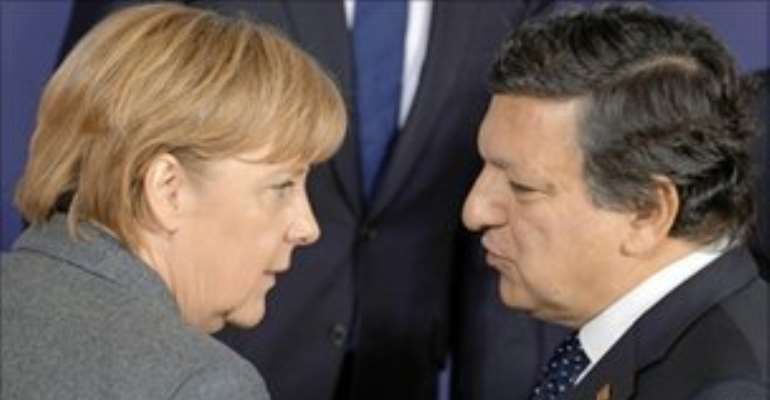EURO WOES GIVE EU’S LISBON TREATY BAPTISM OF FIRE

Germany's Chancellor Merkel (left) gave new impetus to the treaty negotiations in 2007
For many of the EU's citizens, facing job insecurity and public service cuts, the Lisbon Treaty's first birthday this week is hardly cause for celebration.
The treaty's troubled infancy is blighted by deep fissures in the 27-nation EU and a determination already to change the text – however unpalatable that is after eight gruelling years of negotiations.
Harsh economic reality has dashed hopes that Lisbon, in all its complexity, would be the treaty to end all EU treaties, for a good few years at least.
The sad aftermath of the financial meltdown is a far cry from the vision that inspired Lisbon – a vision of well-oiled EU machinery powering a new-generation vehicle for European unity and prosperity, fit for the 21st Century.
The main goal was to streamline decision-making in a union built around slow-moving consensus politics.
During the years when EU leaders were labouring over the treaty eurozone bail-outs were far from their minds.
But this year has seen emergency bail-outs of debt-laden Greece and the Irish Republic – and fears that Portugal and Spain may be next.
Legal minefield
The treaty did not spell out a mechanism for such rescues – hence the calls for treaty change, led by German Chancellor Angela Merkel.
The Maastricht Treaty, which launched monetary union, contained a “no bail-out” clause. Now incorporated into Lisbon, it puts the new bail-outs in a legal grey area.
LISBON TREATY
Created two new top jobs – EU Council president and EU foreign affairs chief
Boosted powers of European Parliament, making co-decision with governments the norm
Paved way for new EU diplomatic service, headed by UK's Baroness Ashton
Took eight years of tough negotiation, including two Irish referendums
Q&A: The Lisbon Treaty
Before Lisbon had been fully ratified last year the Liberal Democrat MEP Andrew Duff predicted that if a bail-out became necessary to save the eurozone “it will certainly be necessary to revise the treaty rules of the monetary union”.
At all costs EU leaders will want to avoid triggering court challenges or referendums on the treaty again. The years of Lisbon wrangling led to a chorus of complaints about EU “navel-gazing”.
The treaty change – probably a case of just a few words – can be done by the EU governments legally under a fast-track procedure. But it will still have to be ratified by the national parliaments.
One option would be to expand Article 122 of the treaty, which says EU funds can be used to help a member state “seriously threatened with severe difficulties caused by natural disasters or exceptional occurrences beyond its control”.
But lawyers may well argue about whether the change involves a clarification of existing EU powers or a new transfer of power to the EU.
EU leaders may agree on the amendment as early as this month, but they will be nervous about the Irish Republic – just as they were last year, when the Irish held a second referendum on the treaty.
The bail-out has left the ruling Irish coalition looking shaky and Irish ratification of any treaty change “can't be taken for granted in the current climate”, according to Marco Incerti, an analyst at the Centre for European Policy Studies (Ceps).
Brussels muscles
The eurozone crisis has however provided a golden opportunity for European Council President Herman Van Rompuy to stamp his authority.
As the EU's first permanent president – a major innovation under Lisbon – he took charge of a special task force on economic governance, to give the EU a crisis mechanism for tackling threats to the euro.
The softly-spoken former Belgian prime minister was seen by some as a colourless consensus figure when he got the job last year.
He was contrasted with Tony Blair, a statesman who could, in the words of former UK Foreign Secretary David Miliband, “stop the traffic in Beijing”.
But quietly, behind the scenes, Mr Van Rompuy has been “appropriating more powers for himself”, Marco Incerti says.
The eurozone crisis and the difficult negotiations over the EU's 2014-2020 budget show the importance of having a permanent president steering the ship, a senior official in the Belgian EU presidency told the BBC.
Lisbon was intended to give the EU more continuity of policy, reducing the disruption caused when member states take it in turns to run EU affairs every six months.
But a British Conservative MEP, Syed Kamall, says Mr Van Rompuy's new role at the hub of EU economic governance suggests “a more integrationist agenda – it rings alarm bells”.
Parliament packs a punch
Lisbon also significantly enhanced the European Parliament's powers – and MEPs are flexing their new muscles.
An early sign of their new clout was the Swift deal on US anti-terror investigators' access to European bank data, where MEPs negotiated extra privacy safeguards for EU citizens.
But MEPs are still feeling their way as Lisbon beds in, Mr Kamall says, and they should avoid “showing power for the sake of it”.
Tough negotiations can be expected soon over agriculture and regional aid – big budget areas where MEPs' powers have not really been tested yet.
The wrangling over the 2011 budget, with MEPs at odds with EU governments, may be just a foretaste of bigger clashes to come.
